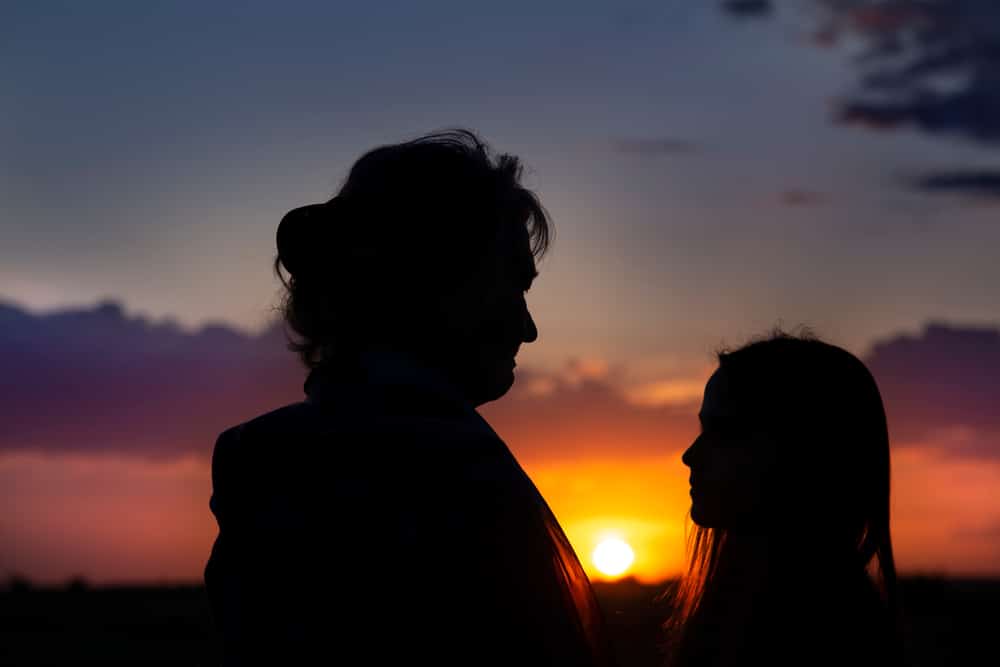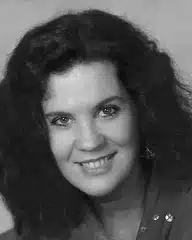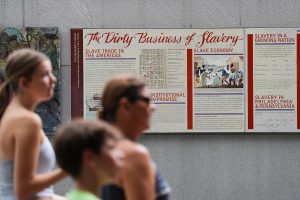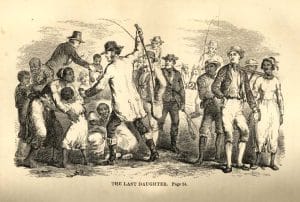Jenna Smith from Bristol has a message for anyone who thinks that no one is struggling in Bucks County. “They aren’t talking to the right people.”
Jenna isn’t her real name. The Bucks County Beacon has agreed to use a name of her choosing to preserve her granddaughter’s privacy. The names of her family members have been changed as well.
Last year, Jenna’s daughter Jaylynn, a single mom, became terminally ill. When she went to a long-term care facility to be fitted with a feeding tube and other life support equipment, Jaylynn lost her ability to care for herself and her 12-year-old daughter, Mia.
After her mom was admitted, Mia moved in with her father and stepmom. Within weeks, Mia’s dad went to jail. Overwhelmed and with kids of her own, Mia’s stepmom, “Just couldn’t handle it,” Jenna explained. “She couldn’t keep Mia and keep her own children’s needs met.”
With neither mother nor father who could care for her, Mia faced homelessness.
Sixty-four-year-old Jenna, a grocery and warehouse worker, opened her home to her granddaughter. Life had to change – dramatically – for both of them. Mia went daily, “sometimes twice a day” to visit her dying mom. And Jenna, a low wage worker who generally put in for extra hours to make ends meet, had to stop taking additional shifts. “I thought I was done [raising children]. I can’t work overtime anymore. I can’t just put in to work extra hours anymore. I have to make sure she’s taken care of.”
Mia’s homeless designation – as defined by the U.S. Department of Education – is intended to allow students like her to provide some semblance of stability, at school, at least. Passed in the early 2000s as part of No Child Left Behind, the legislation amended the existing McKinney-Vento program. The updated homelessness legislation required that all barriers be removed from the education of students identified as homeless. Even students who are “doubled up” – the slang term for individuals and families forced to live with relatives, friends and sometimes strangers – must receive additional support. Essentials like free lunch, waived fees for participation, and transportation to schools outside their new home’s residential district are guaranteed until one year after a family has secured stable housing.
In 2022, the PA Dept. of Ed. identified more than 41,000 school-aged children experiencing homelessness – 857 of them in Bucks County, alone. These numbers include children like Mia “who lack a fixed, regular, and adequate nighttime residence.”
READ: In Bucks County, a Small Church Strives to Help the Ones Around Them
In addition to a dying mom, Mia has a few other needs. Mia receives extra educational support at school. Her status as a student experiencing homelessness means that while the rest of her life is in flux, her schooling doesn’t have to change too.
Mia’s lucky to have her grandmom as her safety net. Without Jenna, Mia might become one of the many unaccompanied and uncounted youth living on the street. Or she might enter the foster system. Living with her grandmother means that she’s been able to speak to and visit her mom regularly – and have a loving home to return to at the end of the day.
Fortunately, she has a grandmom with a home.
Other children and families living double-up don’t land in such loving environments. Despite desperately needing a place of their own, they are ineligible for housing assistance. Regardless of how difficult and overcrowded or potentially abusive a doubled-up situation may be, the U.S. Department Housing and Urban Development (HUD) does not consider Mia – and others like her – as homeless. Consequently, doubled up families who lose their home and are forced to bunk in with others are ineligible for housing assistance.
Organizers of the PA Poor People’s Campaign – a subset of the movement that was begun in 1968 by the late civil rights leader, Martin Luther King, Jr., know that Jenna’s, Jaylynn’s, and Mia’s story is all too real – and too common. Rabbi Michael Pollack, Pennsylvania spokesperson and organizer of an upcoming day of action Saturday commented on her predicament.
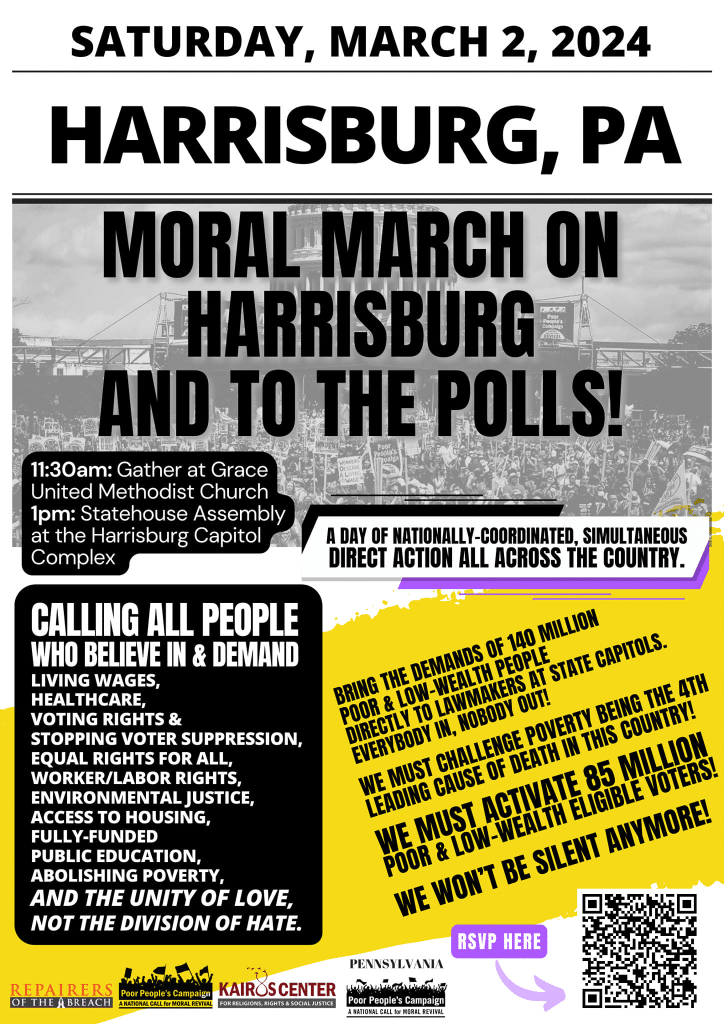
“First I want to acknowledge just how common the story you just laid out is. That story plays out across Pennsylvania and across this country,” said Rabbi Pollack. “There is no shortage of poor people who are suffering and will die in silent agony with no justice being served.”
Pollack went on to explain this year’s call to action starting with Saturday’s mobilization in Harrisburg, is to coincide with the National Poor People’s Campaign, which “will hold simultaneous mass poor people’s and low-wage worker statehouse assemblies across the country in more than 30 states, including Pennsylvania.”
Organizers will again descend on the state house the following Monday to deliver their list of demands to lawmakers. They have identified immediate action that could improve the lives of Pennsylvanians, including the passage of HB1417, which restores adult dental coverage to PA’s Medicaid program. The bill is co-sponsored by Bucks County Rep. Perry Warren.
While the Poor People’s campaign was begun 54 years ago, little has been done to move the needle for families like Jenna’s. Poverty remains the fourth leading cause of death in the United States with 800 people dying daily as a result. Pollack grieves those deaths as both unnecessary and preventable. “Poverty is a solvable problem. The solutions are there. We know what they are. We’ve known what they are forever. The only difference between a poor person and a rich person is how much money they have in their wallet.”
READ: Proposed Law Aims to Keep Pennsylvania’s Homeless Students in School
Jenna’s wallet has taken a hit over the last few months, as she works less for pay and more for free – at home as a full-time parent to her granddaughter. In f40 other nations and 14 U.S. states, she would receive financial assistance to care for Mia, so that she could spend more time with her granddaughter as wrestles with her grief. Pollack knows that Pennsylvania legislators could institute paid family leave for people like Jenna. “The solutions are glaringly obvious to anyone who looks at it. Part of that solution is valuing human rights over property rights.”
Pollack and his fellow organizers understand that the vast majority of people who need reform are too overworked or financially challenged to participate, but he urges them to try. And the rest of society – those who aren’t desperately poor – need to help, too. Especially this year – an election year, “Our votes are not just statements of compliance in a system that is destroying our lives. We urge people to jump in and get organized. We only win what we’re organized to take.”
For Jaylynn, that battle ended a couple of weeks ago. Mia and Jenna now struggle to manage their grief after losing the mother and daughter they love. Still adjusting, Jenna doesn’t know what’s next for the two of them. It’s all too new. The grandmom still wakes up everyday thinking she’ll say to Mia, “‘I’m gonna call your mom’ – but I can’t. She’s not there.”
